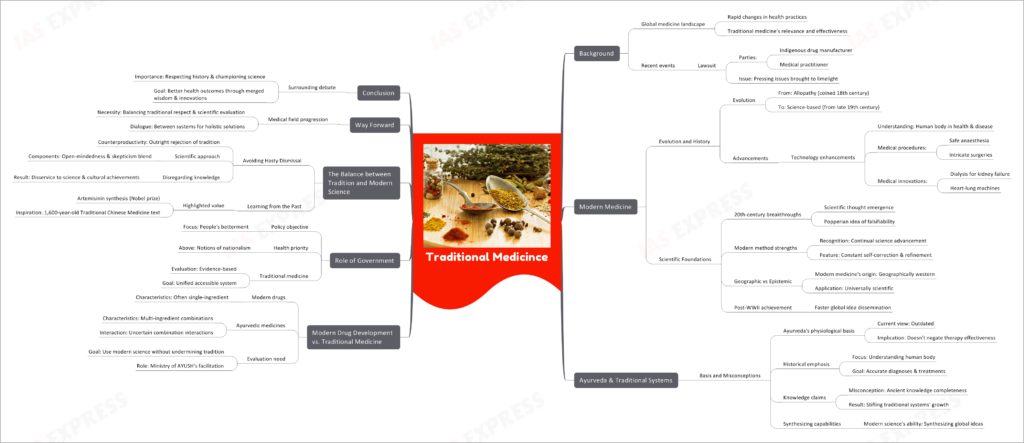Traditional Medicine- Background, Challenges & Learnings
From Current Affairs Notes for UPSC » Editorials & In-depths » This topic
IAS EXPRESS Vs UPSC Prelims 2024: 85+ questions reflected
In the rapidly changing landscape of global medicine and health practices, the relevance and effectiveness of traditional medicines have often been a topic of contention. Recently, a lawsuit involving an indigenous drug manufacturer against a medical practitioner has brought to the limelight these pressing issues.

Modern Medicine
Evolution and History
- Modern medicine evolved from being not just allopathy (a term coined in the 18th century) to being more science-based, especially from the late 19th century onwards.
- Advancements in technology:
- Enhanced understanding of human body functions in both health and disease.
- Enabled safe anaesthesia and intricate surgeries.
- Innovations like dialysis for kidney failure and heart-lung machines.
Scientific Foundations
- Emergence of scientific thought in the 20th century, including the Popperian idea of falsifiability, revolutionized the evaluation of medical therapies.
- Strengths of the modern method:
- Recognizes the continual advancement of science.
- Constant self-correction and refinement.
- Modern medicine is geographically western but universally applicable in its scientific approach.
- One of humanity’s post-WWII achievements is the faster spread of ideas globally.
Ayurveda & Traditional Systems
Basis and Misconceptions
- While Ayurveda’s physiological basis may seem outdated today, it doesn’t mean its therapies aren’t effective.
- Ayurveda’s emphasis was always on understanding the human body for accurate diagnoses and treatments.
- Claims that ancient knowledge already knew everything are misguided and stifle the growth of traditional systems.
- Modern scientific thought has the power to synthesize ideas globally to understand the world better.
Modern Drug Development vs. Traditional Medicine
- Modern drugs are often single-ingredient, while Ayurvedic medicines usually combine multiple ingredients.
- It’s uncertain how these combinations in Ayurveda interact with each other.
- There’s a need to evaluate Ayurvedic medicines using modern scientific methods without undermining their traditional formulations.
- The Ministry of AYUSH should facilitate this synthesis.
Role of Government
- The primary objective of government policies should be the betterment of its people.
- People’s health should be prioritized over notions of nationalism.
- Traditional medical systems should undergo evidence-based evaluations.
- The aim is to integrate what’s useful from traditional systems into a unified system of medicine accessible to everyone.
The Balance between Tradition and Modern Science
Avoiding Hasty Dismissal
- Outright rejection of traditional medical systems is counterproductive.
- The approach to science requires a blend of open-mindedness and skepticism.
- Disregarding time-tested knowledge in the name of science is a disservice to both the scientific approach and historical cultural achievements.
Learning from the Past
- The synthesis of the anti-malarial artemisinin, which won a Nobel prize, was inspired by a 1,600-year-old Traditional Chinese Medicine text, highlighting the value of ancient knowledge.
Way Forward
To progress in the medical field, it’s crucial to strike a balance between respecting traditional knowledge and applying rigorous scientific evaluation. Both systems have their strengths, and by facilitating a dialogue between them, we can pave the way for integrated and holistic medical solutions that benefit everyone.
Conclusion
The debate surrounding the relevance of traditional medicines in the contemporary world underscores the importance of viewing medical practices through a lens that respects historical knowledge while championing scientific scrutiny. By merging the wisdom of the past with the innovations of today, we can ensure better health outcomes for all.
Practice Question for Mains
‘We need evidence-based traditional medicine.’ Discuss. (250 words)
If you like this post, please share your feedback in the comments section below so that we will upload more posts like this.

